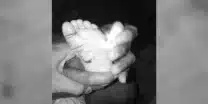rabies kissing
HEADS UP, pet owners: the Department of Health (DOH) has advised the public to avoid kissing their pets.
Why? Because there has been a rise in human rabies cases from the previous year. From January to May 2024, there have been 169 human rabies cases so far, which is a 13% increase from January to May 2023.
This has since led to 160 fatalities, with 92% of those bitten having a history of dog bites, 6% of cat bites, and the rest, of other animal bites.
According to the program manager of the DOH National Rabies Prevention and Control Program, Dr. Raffy Deray, even vaccinated pets can still pass rabies on to their owners.
DOH spokesperson Asec. Albert Domingo explained that an animal’s saliva can be as dangerous as their scratches and bites, with all three a possible cause for the transmission of rabies.
To be safe, DOH recommends vaccinating your pet as early as 3 months old. They should then get vaccinated again every year following this.
If you or your pets start to exhibit any of these symptoms, it’s best to visit your local Animal Bite Center or your veterinarian, respectively.
A disease such as this is one that must be dealt with sooner rather than later, so it’s best to attend to it ASAP. When it comes to the contraction of rabies, death becomes a possibility if it is treated late.
Signs of rabies – and when to go to the vet
So, from the expert opinion of a veterinarian, is it dangerous to kiss your pets?
Dr. Paul John Jimenez Kurihara, who has been working as a veterinarian for 23 years, has seen a number of cases of pet owners contracting rabies as of late.
He said that the odds of vaccinated pets transmitting rabies is unlikely, but there are still times when this may happen, especially when the pet’s vaccinations aren’t updated.
He explained that in the transmission of saliva when kissing your dog, or in having your dog bite or lick your open wounds, you might expose yourself to getting rabies.
He noted that you may expect to see symptoms usually within two to three months, though this may vary. It can start after a week or even a year depending on things like the location of the virus entry as well as the virus load.
Other factors to consider are the age of the patient, as well as whether or not they have gotten a vaccine for rabies.
If ever you feel you are exposed to a pet with rabies, take caution if you start to show the following symptoms:
- Flu
- Fever
- Headache
- Delirium
- Abnormal behavior
- Hallucinations
- Hydrophobia
- Foaming at the mouth
In pets, on the other hand, these are the symptoms you need to look out for:
- Sudden aggressive behavior
- Paralysis / partial paralysis
- Abnormal barking / vocalization
- Attacking inanimate objects
- Hydrophobia
- Foaming at the mouth
- Death
If you or your pets start to exhibit any of these symptoms, it’s best to visit your local Animal Bite Center or your veterinarian, respectively.
A disease such as this is one that must be dealt with sooner rather than later, so it’s best to bring attention to it ASAP. When it comes to the contraction of rabies, death is sure to follow soon after.
Follow republicasia on Facebook, Twitter, and Instagram to get the latest.









